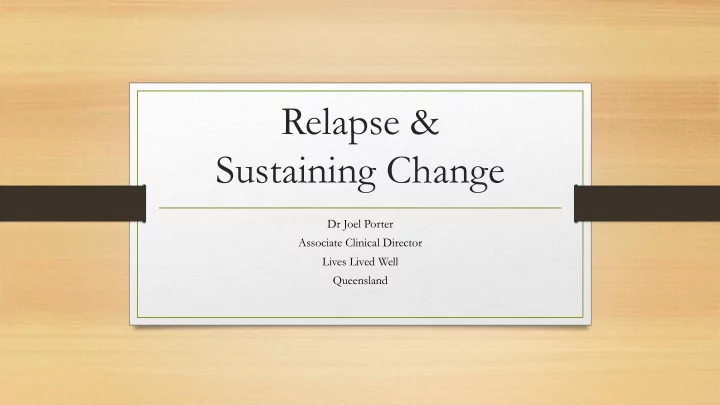

Relapse & Sustaining Change Dr Joel Porter Associate Clinical Director Lives Lived Well Queensland
Relapse: Is that the right word? • Medical term that implies the presence of an illness • Makes an assumption that it is likely to happen • In general, there is an assumption that abstinence = cure • Relapse prevention is often taught as a stand alone module in the course of treatment
Treatment: Another tricky word
The importance of language • The words we choose to articulate our thoughts are a good indication of what we think about working with people who experience gambling related problems • The way we think about gambling problems influences what we do to try and help people makes changes
How do you hear yourself when talking with people about changing their gambling?
Gambling Disorder: What is it? • Learned behaviour • Addiction • Genetic or brain disease • Coping strategy for dealing with • Depression, trauma, anxiety, etc • Oppression and poverty • Boredom
How do you make sense out of problem gambling?
Gambling an Intimate Relationship
The process of falling love • People meet and there is a “spark” • Some fall in love at first sight • Other have a courtship and spend time together • Stop there or keep going towards commitment • Make a formal commitment and live happily ever after • Or, things get hard and its “By God, until death do we part” • Separation, divorce and death
Gambling Disorder: A relationship that’s gone bad
How have you heard your clients describe their relationship with gambling?
Helping people change • Evidence based practice, practice based evidence and best practice • Effect sizes, statistics, methodology, and research language • Efficacy vs. Effectiveness
The Relational Bridge
When we focus solely on behaviour we may be missing the boat…
When content becomes the focus of treatment, we may not see the forest for the trees.
Content vs. Content
What is important? • Therapist • Expectancy: Meet the HARPS • Interpersonal skills • Empathy and Client-Centred interpersonal skills • Fidelity: “People can not benefit from a treatment they did not receive” - Dean Fixen
What else is as important? • Client factors • Initial optimism about treatment effectiveness • Intrinsic motivation to change • Self-efficacy • Hope
Change happens • In the context of an empathic therapeutic relationship • High-empathy counsellors have better success rates regardless of theoretical orientation • Low-empathy confrontational counsellors • Higher drop-out rates • Relapse rates • Weaker therapeutic alliance • Less client change
Favourite Teacher Exercise
Some promising variables for clinical research (Miller & Moyers, 2014) • Therapist effects • Empathy, interpersonal functioning, warmth, unconditional positive regard • Client effects • Change talk : sustain talk ratio (frequency), change talk strength • Self-efficacy, confidence, readiness, importance • Experiencing
Some more promising variables for clinical research • Relational effects • Working alliance • Client feedback • Discourse analysis • Talk time • Basic processes • Sequential analyses of therapist and client responses • Presence of theory-predicted key mechanisms of action
Making & Sustaining Change • Change is a process not an event • People make changes in their own way for their own reasons
The Reality of Change 80 70 60 50 40 30 20 10 0 Stop Cut Down Keep Going
Making & Sustaining Change • Change is a process not an event • People make changes in their own way for their own reasons • People sustain change because it is worth their while • The pay for changing gambling is as good or better than the gambling • Relationships, self-worth, finances and self-efficacy improve
Self-Regulation & Self-Control • Self-Regulation • The ability to be with your thoughts and feelings (comfortable and uncomfortable ones) in a way that does create harm. • Self-Control • Is a behavioural measure. Our ability to govern our choices of we react under stress or impulse.
May be a radical thought… The goal of counselling is not preventing relapse
But To help people find their way to making and sustaining change based on what is important to them.
What helps people sustain change • Increased motivation and committeemen to change • Increased self-efficacy and confidence • Increased enjoyment in life • Time
Take away messages • Be informed • Read a broad spectrum of research and expose yourself to different theories • Think for yourself • Be integrative and flexible • It’s not always what you do but how you do it • Know what you are doing, why you are doing and what outcome you are aiming for • Trust in you desire to help • A little bit of empathy, kindness and belief in your clients goes a long way
Recommend
More recommend